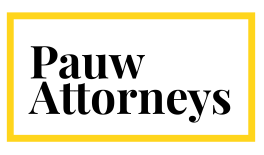Labour Law!
Pauw Attorneys are rated one of the top labour lawyers in Port Elizabeth. We deal with the Labour Courts and CCMA on a regular basis and are able to assist you with all facets of CCMA litigation and labour court litigation.
| "Labour Law regulates the relationship between employer and employee"
Areas of practice:
- Employment contracts
- Unfair dismissals
- Disciplinary hearings
- Planning of employment policies
- CCMA and Bargaining Council Processes
- Labour Court Litigation
- Retrenchments
- Mutual Separation Agreements
1. Employment Contracts
An employment contract is an agreement that covers the working relationship between a company and an employee. It allows both parties to clearly understand their obligations and the terms of employment. Pauw Attorneys offer assistance in:
- Permanent employment contract;
- Fixed Term Contracts;
- Independent contractor contracts;
- Mutual separation Agreements;
- Written and/or final warnings;
- Notice to Attend disciplinary hearings; and
- Notice of Suspension.
Employment contracts need to offer security to both employee and employer and need to include the following information:
- Identifying the employer and employee
- Position or role of the employee
- Role Requirements
- Terms and Conditions of the employment
- Job Description
- Remuneration
- Leave and off days
- Breach and Termination
- Dispute resolution
2. Unfair Dismissal
In cases where an employee claims that they were unfairly dismissed the employee has to prove that there was in fact a dismissal. The normal definition of a dismissal as the “termination of a contract of employment” does not capture the full concept of a dismissal in terms of South African legislation. It is important to follow the correct procedures.
The following procedural fairness checklist will apply to all disciplinary hearings, whether for misconduct, incapacity or operational requirements dismissals. Remember also that procedural fairness applies even if the sanction is only a written warning.
Procedural check list. (have you followed a fair procedure ?)
- Original complaint received in writing.
- Complaint fully investigated and all aspects of investigation recorded in writing.
- Written statements taken down from complainant and all witnesses.
- Accused advised in writing of date, time and venue of disciplinary hearing.
- Accused to have reasonable time in which to prepare his defence and appoint his representative.
- Accused advised in writing of the full nature and details of the charge/s against him.
- Accused advised in writing of his/her rights.
- Complainant provides copies of all written statements to accused.
- Chairperson appointed from outside the organization.
- Disciplinary hearing is held.
- Accused given the opportunity to plead to the charges.
- Complainant puts their case first, leading evidence and calling witnesses to testify.
- Accused is given opportunity to cross question witnesses.
- Accused leads evidence in his defence.
- Accused calls his witnesses to testify and complainant is given opportunity to cross question accused's witnesses.
- Chairperson adjourns hearing for at least 3 days to have minutes typed up or transcribed.
- Accused is immediately handed a copy of the minutes.
- Chairperson considers whether a fair procedure has been followed.
- Chairperson decides on guilt or innocence based on the evidence presented by both sides and on the balance of probability – which story is more likely to be true? That of the complainant or that of the accused? That is the basis on which guilt or innocence is decided. In weighing up the balance of probability, the previous disciplinary record of the accused, his personal circumstances, his previous work record, mitigating circumstances etc are all EXCLUDED from the picture – these aspects are considered only when deciding on a suitable and fair sanction. The decision on guilt or innocence is decided only on the basis of evidence presented and in terms of the balance of probability.
- Chairperson reconvenes the hearing.
- Chairperson advises accused of guilty verdict. If not guilty, this is confirmed in writing to the accused and the matter is closed. If guilty, then :
- Chairperson asks accused if he/she has anything to add in mitigation of sentence.
- Chairperson adjourns meeting again to consider any mitigating facts now added.
- Chairperson considers and decides on a fair sanction.
- Chairperson reconvenes hearing and delivers the sanction.
- Chairperson advises the accused of his/her rights to appeal and to refer the matter to the CCMA.
3. Disciplinary hearings
Pauw Attorneys can assist in the following ways:
- Chairing disciplinary hearings;
- Providing recommendations;
- Acting on behalf of Complainant; and
- Acting on behalf of employee.
- Preparing the Disciplinary Notice
In situations where an employer suspects their employee has engaged in misbehaviour, disciplinary proceedings must be held. The goal of the disciplinary investigation is to determine whether the employee has actually engaged in misbehaviour.
According to the Labour Relations Act, it is deemed procedurally unfair to take action against an employee while no disciplinary investigation has been conducted.
Each party will have a chance to present their case to the chairperson during the hearing. The chairperson weighs the evidence before deciding if they believe that there has been misconduct.
The chairperson recommends the proper disciplinary action that should be taken against the employee after concluding that wrongdoing occurred.
4. Planning of Employment Policies
Strategic planning is a process in which an organization's leaders define their vision for the future and identify their organization's goals and objectives. The idea is to have the employees grow towards the same goals in the company. A company policy is a set of general guidelines that outlines the company's plan for confronting problems they might face. This should include the rights for both employee and employer.
Advantages of having a clear company policy is:
- provide workers with knowledge about what is expected of them, e.g. behaviour and performance standards;
- provide rules and guidelines for decision-making in routine situations;
- provide a consistent and clear response across the company in dealing with situations;
- demonstrate your good faith that workers will be treated fairly and equally;
- provide an accepted method of dealing with complaints and misunderstandings to help avoid claims of bias and favouritism;
- provide a clear framework for the delegation of decision-making;
- provide a means of communicating information to new workers; and
- ensure that you are better equipped to defend claims of a breach of employer obligations, e.g. health and safety legislation.
Pauw Attorneys can assist you to draw up a employment policies that will suit your company.
5. CCMA and Bargaining Council Processes
We support parties in the institution and/or defence of any CCMA disputes.
The CCMA is an exclusive forum with its own procedures. It is crucial that these procedures and guidelines are recognised and followed when dealing with CCMA issues. We are prepared to help our clients follow the guidelines and procedures outlined in the CCMA.
Conciliations: When a disagreement is referred to the CCMA, conciliation typically takes place at the initial hearing. The parties try to settle their disagreement and establish a mutually agreeable solution during this phase. They are assisted in reaching this resolution by the commissioner and, if applicable, the parties' representatives. Arbitration is then requested if the conflict cannot be settled.
Arbitrations: In that the parties prepare their arguments and supporting materials before presenting them to the Commissioner overseeing the case, arbitrations are very similar to trials in civil courts. After all the evidence has been presented and taken into account, the commissioner acts as an arbitrator and renders a final, conclusive verdict.
Con/arb
A conciliation and arbitration are combined to form a con/arb. If the parties are unable to reach an agreement through conciliation, the matter moves to arbitration the same day, unless one of the parties objects to arbitration starting right away. Before the hearing, such an objection is made in writing.
Applications for revocation: A person who was the subject of an order made in their absence may request revocation from the CCMA. A rescission application is what this is known as.
The applicant must submit their application on time and demonstrate that they have a defence to the claim brought against them at the CCMA in order to successfully request a rescission.
Certification of a judgement from arbitration (Form 7.18)
The opposite party may request certification of the arbitration award if it has been issued but one of the parties refuses to abide by it. This makes it possible for the Sheriff of the Court to enforce the judgement.
Application of Section 142A
If a party violates a settlement agreement obtained through conciliation, the aggrieved party may move under Section 142A to have the settlement agreement recognised as an arbitration award.
6. Labour Court Litigation.
The Labour Court carries the full status of a High Court and is the highest authority (apart from the appeal courts) when it comes to labour disputes. The Labour Court may be approached directly in some cases, but also serves as a review court for parties who are unsatisfied with a decision by the CCMA or a bargaining council.
Statement of Case:
When a party wishes to institute a claim in the Labour Court, in most instances this will be done by way of preparing a Statement of Case.
We assist our clients with all aspects related to instituting a matter by means of a statement of case, from preparation of documents to appearing at trial.
Review applications:
When an arbitration award has been made and a party does not agree with the outcome thereof, the matter can be taken on Review to the Labour Court.
We assist with the institution and defending of review applications.
7. Retrenchments.
- Drafting of Notices;
- Assisting with general advice;
- Assisting in the retrenchment process.
Retrenchment is a form of dismissal due to no fault of the employee, it is a process whereby the employer reviews its business needs in order to increase profits or limit losses, which leads to reducing its employees.
The employer must give fair reasons for making the decision to retrench and follow a fair procedure when making such a decision or the retrenchment may be considered unfair.
Feel free to reach out to Pauw Attorneys to assist you with any retrenchment concerns you might have.
8. Mutual Separation Agreement
The agreement that specifies how the professional relationship has ended is known as a Mutual Separation Agreement. In certain situations, both the employer and the employee concur that the working relationship should cease.
The rights and responsibilities of the employer and employee are spelled out in a mutual separation agreement through a legally enforceable contract.
The parties avoid the additional stress, expense, and time involved with a CCMA dispute by entering into an MSA.
Employers can receive fair, enforceable, and legally sound mutual separation agreements with the help of our expert labour lawyers. We also offer advice support to employees who have received an MSA, ensuring that their interests are protected in the final, signed MSA.


